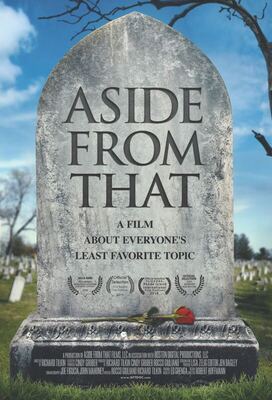About
Aside From That is a journey of discovery. We start with the premise that we all yearn for a bit of wisdom that might ease our path through life and our passage to whatever – if anything – lies beyond.
We want to test the idea that there is – to borrow a phrase – a BEST PRACTICE for thinking about our own mortality, an attitude or philosophy that might enable us to live our lives in a more meaningful way. To this end, we seek the perspectives of philosophers, academics, and clerics as well as “real” people from all walks of life.
Among those featured are:
But at the heart of our film, illuminating universal themes of death, uncertainty and trauma are three people whose stories are extraordinary and unforgettable:
We also meet random pedestrians in cities from Seattle, Washington to Boston, Massachusetts, ambushed on their lunch hour with questions about death.
Rather than focusing on the hospice, lecture hall, scientific laboratory, or funeral industry, we probe the minds and lives of “real” people, searching, like the rest of us, for clues about how best to live, think and behave when rudely confronted with our own mortality.
We want to test the idea that there is – to borrow a phrase – a BEST PRACTICE for thinking about our own mortality, an attitude or philosophy that might enable us to live our lives in a more meaningful way. To this end, we seek the perspectives of philosophers, academics, and clerics as well as “real” people from all walks of life.
Among those featured are:
- Joan Halifax, an American Buddhist, anthropologist and author of several books on Buddhism and spirituality, and a pioneer in end-of-life care
- Legendary comedian Steven Wright, known for his deadpan, mordant wit and trenchant observations on life and death.
- Dr. John Wynn of the Swedish Medical Center, Seattle, WA, a board member of the Ernest Becker Foundation and frequent lecturer on death awareness and anxiety
- John B. Williamson, a professor of sociology at Boston College with a PhD from Harvard, author or co-author of 16 books on aging policy
- Dr. Graeme Steele, a surgeon and oncologist at Brigham and Women's Hospital and affiliate of Harvard Medical School
- Gaynor Blandford, a professor at the Boston Conservatory and Emerson College, where she teaches a course on mortality
But at the heart of our film, illuminating universal themes of death, uncertainty and trauma are three people whose stories are extraordinary and unforgettable:
- Born to Holocaust survivors in a displaced person’s camp at the end of WWII, and now facing an incurable degenerative disease, Rachel engages in a race against time to accomplish a highly unorthodox goal
- A native of Kansas, the Heartland of America, 20-year-old former cheerleader and pre-med student Meghan is living the quintessential American dream – until her world is rocked by a grave diagnosis and relapse with 50/50 odds of survival
- An Iraq war veteran haunted by images of mutilation and death in a 24/7 nightmare from which there is no respite, Michael struggles to reconcile his self-proclaimed identity as a nihilist with his very real love for his girlfriend and daughter.
We also meet random pedestrians in cities from Seattle, Washington to Boston, Massachusetts, ambushed on their lunch hour with questions about death.
Rather than focusing on the hospice, lecture hall, scientific laboratory, or funeral industry, we probe the minds and lives of “real” people, searching, like the rest of us, for clues about how best to live, think and behave when rudely confronted with our own mortality.

